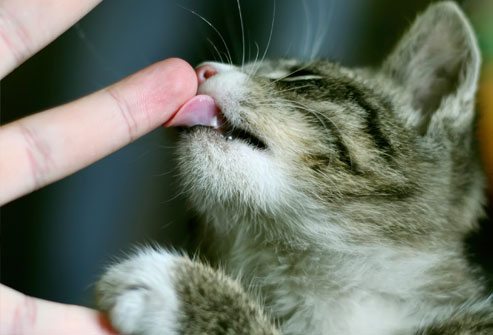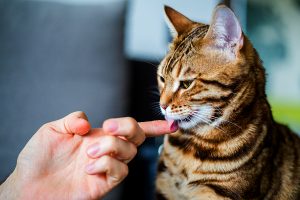
[vc_row][vc_column][vc_column_text]Michelle Andrews from WA writes: My 11 year old cat has been diagnosed with kidney disease and she has to have tablets for the rest of her life. Giving her medication has always been a traumatic experience for us both. Do you have any advice on how I can get her to take it every day?
Nothing is more stressful to you and your cat than administering medication that a cat does not wish to take. It can take countless attempts, cause physical casualties and even trips to the hospital (for you, not your cat!). I have two senior cats, with early stage kidney disease, which means they are destined to have medications and natural remedies for the rest of their days. I knew this was going to need a great system, a lot of patience, perseverance and determination on my part. I can successfully say that five years later, my cats take their tablet and their natural supplements daily with minimal fuss and no trips to the vet or hospital. They also still LOVE ME!
Read on for my tried and tested tips on how to successfully administer medication to your cats:
Tip 1# Communicate with your cats.
Explain why they need to have these tablets and remedies, how it is going to help them feel better, that you are doing this for their best interest and because you love them. Communication is one of the crucial keys to success. No one likes to be forced into doing something they do not like, and we know cats will not allow us to do so if they can help it. Knowing what is going to happen will help your cats to relax and feel less attacked when its medication time. Asking your cat to work with you and gently encouraging them to take the mixture and tablet does go a long way. I have even said to my cats – Humour me I feel I need to do this to help you even if you don’t! You can communicate verbally with them during this explanation. You may think you can’t hear them reply but they can hear you loud and clear. You will need to be in a clam state and not allowing your mind to be scattered all over the place while talking to them. Stay in the present, the ‘NOW’. If you are still worried you may not get it write then book a consultation with Animal Talk and we will do it for you.
Have the information translated to your Feline friend via Animal Talk https://animaltalk.com.au/bookings/
Tip 2# Keep your cat’s medication separate to their food
Feed your cat their meals before administering any medication. No one likes to taste bitter herbs or powders in their food. For many cats, meal times are the best part of the day! Let them enjoy it, so they will be relaxed and more willing to indulge you when its time for their medication. If you put their tablets in their food, it can turn them off eating and avoiding any food you try to give them. Particularly for senior cats or cats with kidney disease we do not want them to lose unnecessary weight.
Tip 3# Give your cat’s tablet in something tasty.
What is your cat’s favourite food? Is there a tasty treat they really enjoy? Give them something enjoyable to go with the tablet so they will eat it right up. However, that didn’t work for me so I put a small amount of butter around my cat’s tablet. You need to make sure you coat it well and completely. My cats love this and will eat it up every time.
Tip 4# Add a small amount of yoghurt to the mixtures.
If your cat is also taking natural remedies, you are most likely mixing together a few oils and powders together. Try mixing in a little unflavoured and unsweetened yoghurt. It will make the remedy mixture less runny and more palatable for your cat. Now if you have cats that won’t even take the tablet with a butter coating then you can crush the tablet and add it to the rest of the mixture. (Ask your vet if it is okay to crush the tablet). The key is to only add enough yoghurt to blend the ingredients together. Don’t make it a huge dob of yoghurt as then you have more for your cat to endure. The minimal the mixture the more success you will have.
Bring your cat up onto the bench sitting them on something non-slip. Gently dab a little mixture on or across their mouth their mouth with your finger. If this is the first time you are trying this method with your cat, give them time to lick the mixture off their mouth and allow them to pause before giving the next dosage. Take your time; giving small dosages for them to cope with, you don’t want to put them off with massive amounts of mixture all over their face. (Avoid going up their nose.)
See a video on our Youtube Channel

It may sound easier than it looks, but I encourage you to not give up. In the beginning, give yourself plenty of time to try these tips with your cat and watch how they respond. Your cat may prefer you to wipe less of the mixture on their mouth or they may be happier to lick it off your finger instead. Work together, and be prepared for days where they may just not be feeling like cooperating. Have patience, persevere but never give up. Your cat will thank you for it, and you will both be relaxed and happy at every medication time.[/vc_column_text][/vc_column][/vc_row]
